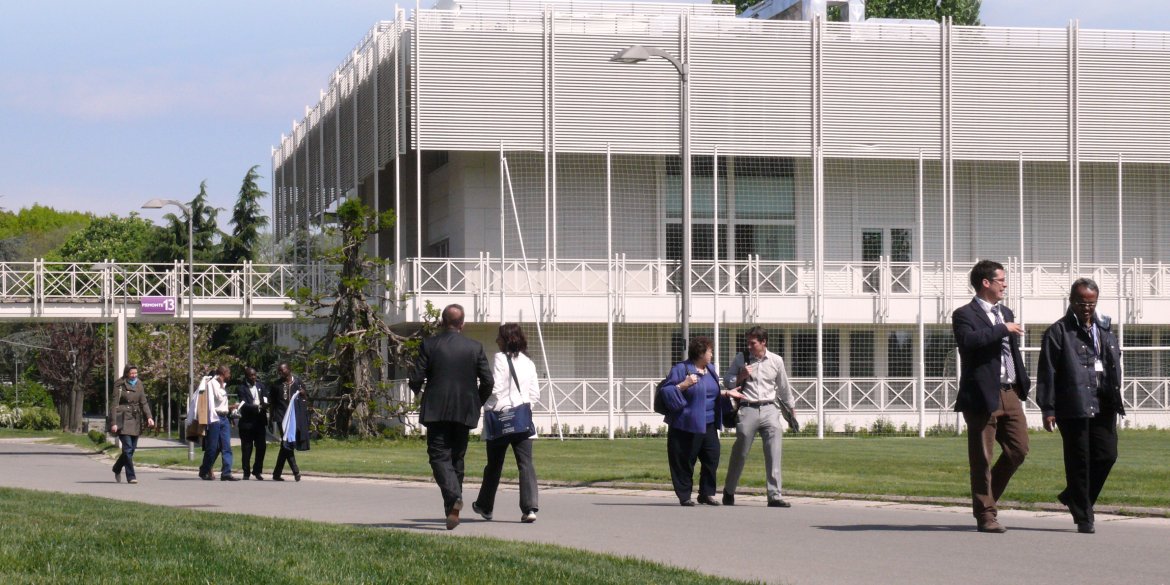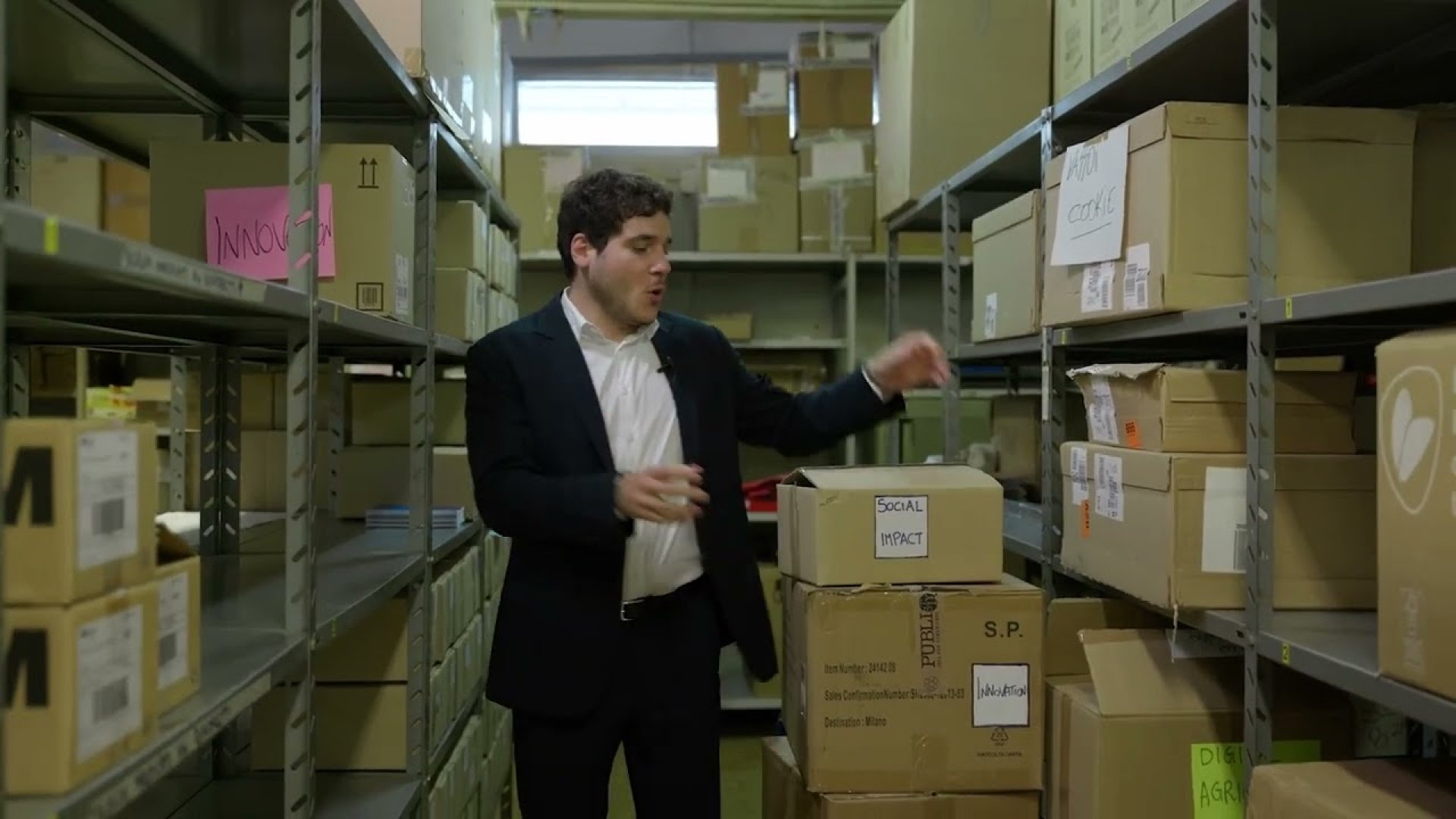Master in Technology and Public Policy

Photo © Adobe Stock/Summit Art Creations
Master
Master in Technology and Public Policy
1 novembre 2026–31 octobre 2027
Le cours est disponible en English
This intensive, one-year blended programme combines online learning and an immersive residential phase in Turin. Designed for professionals in public administration, technology, and policy sectors, the Master’s Programme offers a deep dive into technological innovation, public policy design, and their impact on social sustainability. Engage with global experts, work on real-world projects, and enhance your career prospects. Discover more and apply today!
Key features
Innovative learning approach
Engage in hands-on learning through case studies, interactive workshops, visits to cutting-edge research centers, and collaborative policy labs.
Dynamic discussions
Share insights and ideas with a diverse international faculty and peers, enhancing your learning with a global perspective.
Expert engagement
Connect with leading experts from the ILO, ITCILO, and top academics from Politecnico di Torino and other renowned institutions.
Blended learning experience
Enjoy the flexibility of online modules combined with an immersive residential phase in Turin, offering both virtual and in-person learning opportunities.
Présentation du Master
Global trends show that technological innovation, digital transformation and the revolution in artificial intelligence are shaping unprecedented and challenging future scenarios. Public-policy and decision-making processes need to adapt their strategies to respond promptly and effectively to forthcoming challenges and shape a sustainable future from an economic, social and environmental perspective. To deal with the future challenges posed by technological change, the International Training Centre of the ILO (ITCILO), under the auspices of the Turin School of Development (TSD) and in partnership with the Politecnico di Torino, is offering this Master in Technology and Public Policy - Achieving Social Impact. Taught by a global faculty, participants will be able to: - understand the features of technological innovation in various fields, from digitalization, green energy and the circular economy to space economy, e-health and the silver economy; - thoroughly examine the links between technological innovation processes and public-policy production; - analyse the social, economic, legal and cultural determinants of technology and its impacts on both the economy and society; - assess public-policy interventions in response to issues arising from the use of new technologies; - design public-policy responses to targeted questions in different technological and institutional contexts and explore how new forms of innovation can contribute to social, economic and ecological sustainability. Participants will acquire a combination of scientific, technical and policy-analysis tools, techniques and skills for recognizing and anticipating change, while responding to complex situations in their respective fields. Throughout the course, participants will be supported in the design and development of a specific project addressing challenges posed by the continuous process of technological innovation. This will constitute their final thesis.
Groupes cibles
The Master is intended for officials and/or professionals working in the public administration and international organizations in the fields of economic, technological, industrial and social policy; experts in the public affairs departments of technology companies; practitioners in the field of industrial and employment relations from both the private and the public sector; officials of trade unions and employers' organizations; policy analysts working for national and international think tanks, financial institutions, research departments of banks, insurance companies and foundations; young graduates who intend to pursue a career in public administration, international organizations, NGOs, strategy and policy consultancy firms and leading technology companies. The essential requirements for admission are a Bachelor's Degree (minimum three years' duration), fluency in English, ability to use a computer and access to the internet.
Methodology
The Master in Technology and Public Policy – Achieving Social Impact employs a dynamic, blended learning approach to equip you with the skills needed to effectively influence and manage technological advancements through public policy. This programme seamlessly integrates theoretical insights with practical applications, offering a comprehensive perspective on using technology to address global challenges.
Our blended learning format combines online lectures with an immersive residential phase in Turin. You’ll benefit from interactive lectures, seminars, and workshops led by distinguished experts from academia and international organizations. Practical elements, including case studies, real-world projects, and collaborative exercises, ensure that you apply theoretical knowledge to real-world scenarios.
Innovative tools such as virtual simulations and interactive online resources enhance your learning experience, making it both modern and engaging. The programme culminates in a final project where you’ll develop a detailed proposal utilizing the technological and policy strategies learned throughout the course. Dedicated tutors provide continuous support to guide you towards academic and professional excellence.
Assessment
The Master in Technology and Public Policy – Achieving Social Impact employs a comprehensive array of assessment methods to thoroughly evaluate your grasp and practical application of technology-driven public policy solutions. Written exams test your understanding of fundamental concepts, technological frameworks, and policy theories, ensuring you have a robust theoretical foundation. Practical assignments, such as case studies and project simulations, provide opportunities to apply your knowledge to real-world challenges, fostering innovative solutions for complex development issues.
Participants are also engaged in both individual and group projects that address specific problems within the realm of technology and public policy. These projects involve in-depth research and the development of practical solutions, enhancing your ability to collaborate and think critically. Oral presentations are incorporated to assess your proficiency in communicating complex technological and policy issues, honing your presentation and advocacy skills.
Continuous assessment through quizzes, interactive discussions, and active participation in workshops helps track your progress and ensures consistent engagement throughout the programme. The experience culminates in a final project where you will develop a detailed proposal, demonstrating your capability to apply the technological strategies and policy skills acquired during your studies. This final project highlights your readiness to lead impactful initiatives in the field of international development.
Duration, language and venue
The Master in Technology and Public Policy – Achieving Social Impact is a one-year programme structured into three distinct phases: online learning, a mandatory residential phase, and a final project and research component.
The entire programme is delivered in English, so proficiency in the language is essential for successful participation and comprehension.
The first phase consists of online lectures, allowing you to build a solid foundational understanding of public policy design and innovation management and strategies. Online lectures will be held twice a week (typically on Tuesdays and Thursdays, from 2:00 to 5:00 PM CET), whose attendance is compulsory (a few absences will be allowed).
The second phase consists of a mandatory residential period at the International Training Centre of the ILO (ITCILO) in Turin, Italy. Therefore, classes are delivered in presence at the ITCILO Campus, from Monday to Friday (9.30 am to 4 pm, Italy time zone).
This immersive experience offers in-person instruction and interactive learning opportunities, facilitating direct engagement with experts and peers.
The final phase is dedicated to researching and developing a comprehensive policy intervention project aimed at addressing key technological challenges and opportunities. This phase is designed in a hybrid format, allowing students to work remotely while benefiting from continuous online support and feedback from faculty. Through this process, participants refine their ability to apply theoretical knowledge to real-world policy issues, ensuring that their proposed interventions are both innovative and actionable.
Structured learning schedule
The Master in Technology and Public Policy – Achieving Social Impact features a well-organized and practical learning pathway, divided into three key phases:
Phases details
- Preparatory phase (online)
- Residential phase (on campus)
- Applied project and research phase (hybrid)
- Final evaluation and certification:
- Duration: 6 months
- Focus: Building a foundational understanding of technological innovation and its role in public policy. This phase covers topics such as digital transformation, innovation management, and policy frameworks.
- Activities: Online lectures, held twice a week (typically on Tuesdays and Thursdays, from 2:00 to 5:00 PM CET), whose attendance is compulsory; case studies, and collaborative workshops.
- Duration: 2 months
- Location: ITCILO campus in Turin, Italy
- Focus: In-depth training on the application of technology in public policy, including policy design, impact evaluation, and socio-technical systems. This phase includes hands-on workshops and interactive sessions with experts.
- Activities: Classes delivered in presence at the ITCILO Campus, from Monday to Friday (9.30 am to 4 pm, Italy time zone – compulsory attendance), workshops led by international experts, site visits to research centres, policy labs and project work.
- Duration: 4 months
- Focus: Developing a comprehensive policy intervention project aimed at addressing key technological challenges and opportunities. Emphasis is placed on applying theoretical knowledge to real-world issues and creating impactful solutions.
- Activities: Independent research, project development through home-based research, ongoing online support and mentorship from faculty.
- Focus: Assessing the comprehensive skills and knowledge gained throughout the programme.
- Activities: Final submission of the written project/final thesis and issuance of the Master’s degree upon successful completion.
Objectives
The Master in Technology and Public Policy – Achieving Social Impact is crafted to provide participants with a deep understanding of how technology can influence and enhance public policy and governance. The programme combines cutting-edge technological theories with practical skills to address contemporary policy challenges.
Participants will acquire expertise in leveraging technological innovations, data analytics, and advanced tech solutions to shape and implement effective public policies. The curriculum emphasizes practical applications, including the integration of technology into policy design, the optimization of resource allocation, and the promotion of sustainable development goals. Through engaging projects, interactive workshops, and real-world case studies, you will develop competencies in addressing complex issues such as digital transformation, technology-driven policy-making, and the evaluation of tech impacts.
The programme also focuses on equipping you with the skills to assess and measure the effectiveness of technology-driven policy interventions. It emphasizes strategic planning, project management, and cross-sector collaboration, preparing you to lead and manage impactful technological initiatives within various public and international contexts.
By collaborating with leading experts and participating in innovative learning experiences, the Master’s programme offers significant networking opportunities and positions you as a forward-thinking leader ready to drive technological advancements in public policy and governance.
What are the topics?
- Technological innovation, digital transformation and Artificial Intelligence revolution
- Public policy design and production for new technological scenarios and social challenges;
- Technology for Sustainability, Inculsion and Social Impact;
- Policy impact evaluation;
- Sustainable transitions through socio-technical system shifts;
- Economics of innovation, employment and labour markets;
- Public policy design and project management.
Faculty
Our Master’s programme features a distinguished faculty comprising leading academics, industry experts, and seasoned practitioners from organizations such as ITCILO, the UN, and prominent tech-focused development agencies. Each faculty member brings a wealth of real-world experience and cutting-edge knowledge, offering unique insights into the intersection of technology and public policy. Their expertise and innovative methodologies will guide you through a transformative learning experience, equipping you with the skills and perspectives needed for impactful roles in technology-driven public policy and international development cooperation.

5 reasons to choose the Turin School of Development
- 1. Global expertise and diverse faculty: TSD boasts a faculty comprising leading university professors, senior practitioners, and UN experts from over 80 renowned institutions worldwide. This diverse team ensures a rich, multidisciplinary educational experience that integrates global knowledge with practical expertise.
- 2. Innovative and sustainable learning: TSD’s programmes are designed to be cutting-edge, incorporating the latest technological advancements and sustainable practices. The combination of distance learning, face-to-face interaction, and applied project work minimizes participants’ absence from their professional duties while maximizing learning outcomes.
- 3. Strong connection with UN and specialized agencies: As part of the International Training Centre of the ILO, TSD leverages its unique position within the UN system. This connection provides unparalleled access to specialized knowledge and enhances the comparative advantage of its Master’s programmes in areas such as human rights, social justice, and sustainable development.
- 4. Comprehensive career preparation: TSD graduates are equipped with the essential competencies needed for careers in international organizations, governments, and NGOs. The programmes blend academic rigor with practical application, preparing students to tackle contemporary challenges in fields like international development, social innovation, and technology and public policy.
- 5. Multicultural and international environment: With participants from all over the world, TSD offers a truly global learning experience. Students broaden their horizons, enhance their managerial skills, and build a strong professional network by interacting with peers from diverse cultural and professional backgrounds.
Choosing TSD means joining a community dedicated to advancing social justice and sustainable development through high-quality, innovative education.
How to enroll
- Apply: Use the Apply now button, above, to fill out the application form.
- Confirmation: Successful candidates will receive confirmation, guidelines, and an invoice from the Centre.
- Payment: Secure your place by making the required payment, due at least 14 days before the course starts.
- Cancellation: If you need to cancel, notify us at least 14 days before the course start date to avoid penalties.
For more details on applications, payments, and cancellation policies, please refer to our Practical Information section or contact admissions@itcilo.org for general inquiries.




